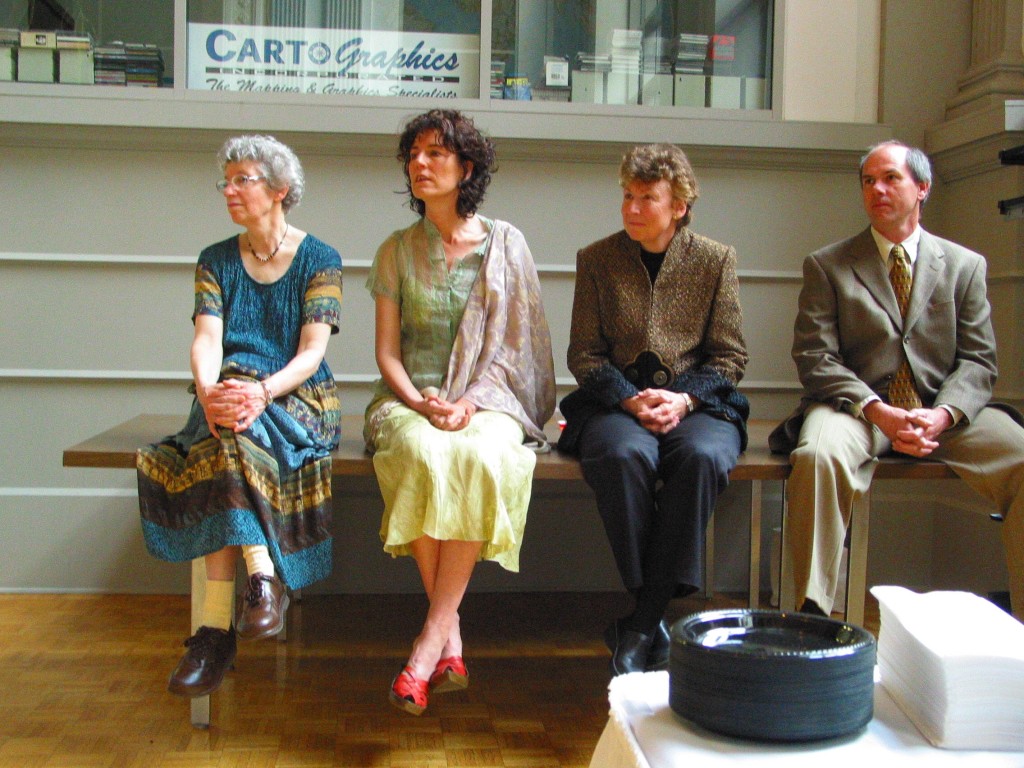
Photo Credit: LaVona Sherarts, 2005
From left to right Jan Greenfield Forsberg, Laurie Dack, Valerie Ohanian, and Eric Sommermann
Jason-Aeric Huenecke of Oceans
Northwestern Academy of Homeopathy Class IV Commencement Speech
9 April 2005
In the 1872 graduation address of the New York Homeopathic Medical College, Dean Carroll Dunham said, “Your very first case may be the most difficult you will ever encounter, and, if you have been placed in charge you must meet the difficulties, call what aid may be within reach; but, aided or not, never flinch from the responsibility so long as the patient demands your services. For the cases which are entrusted to us brook no delay.”
Johann Wolfgang von Goethe wrote, “As soon as you trust yourself, you will know how to live.” This is the task before us, to learn how to trust ourselves so that we can respond accordingly to the basic needs of our patients.
Our journeys as students of homeopathy have been mythic in proportion. We have utterly and permanently transformed our lives in such a way that we do not fully understand what we have accomplished, nor what we are capable of. To embark on this journey as homeopathic practitioners, we must ask ourselves, “Do I trust myself?”
Our loved ones have supported us through this educational process and may have been at times bewildered, wondering, “What are you studying now!?” and, “What do these unusual ideas have to do with healing?”
Homeopathy has required us to be archeologists, mythologists, botanists, zoologists, entomologists, herbivores, and mineralogists, and cultivators of heart. You cannot, in my humble opinion, be a homeopathic practitioner unless you learn to trust yourself and to enter into the mysterious unfolding of those invisible truths of beauty and goodness articulated in every culture, spiritual tradition, and religion of the world, the golden rule, the ethic of reciprocity. You cannot ask another to open up, unless you’re willing to open up yourself in your own process of learning to trust yourself. So, the question is “Can we be trusted?”
We have received one of the finest homeopathic educations in the modern world at the Northwestern Academy of Homeopathy. We have learned that we will only be trusted in as much as we trust ourselves. After all of our training, do you doubt the fact that our lives continuously bring us opportunities to cultivate our hearts? I do not doubt this eternal truth.
I have witnessed each person in our class undergo transformations, some subtle, some barely noticeable, but to the discerning eye, present nonetheless. Others experienced monumental life alterations: major relationship disruptions and changes, marriages, divorce, and the birth of several children in a four and a half year time span. We have unearthed character traits and mysteries within us, heretofore unknown to our loved ones, let alone ourselves.
Damaris Parker-Rhodes asked, “How do I dwell in the eternity of the moment? By letting the eternity of the moment dwell in me.”
Sitting before an individual who seeks healing is like entering the eternity of the moment. May we learn to be comfortable dwelling in the uncertainty of eternity as we develop direct perception into that which most needs healing…
We must also cultivate fortitude. What do we expect? That our lives as homeopathic practitioners will be easy? Hardly, it is work, but it is a great work and service to all of humanity. Just think of the archaic medical practices and methods our ancestors endured and survived that enabled us to be here today! Fortitude is derived from knowing that the very same elements that created this cosmos flow through us! Coming to this understanding, you grow in your awareness of your connection to the mysteries of the cosmos and therefore, all life. Remember, you do not need to be smarter (endlessly pursuing further education) or more intelligent to practice homeopathy, instead, you must know yourself, trust yourself and cultivate a heart-centered approach to living homeopathically. Albert Einstein was quoted as saying, “It’s not that I am so smart, it’s just that I stay with problems longer [than most]…”
Recently, one of my patients asked me, “How long will this homeopathic process take?” I replied, “As long as it needs to…” To which she answered, “Oh well, at least you are honest.” Consider this, what else are you going to do? We must learn to stay with the problems of our humanness longer if we are going to enter more fully into a state of radical acceptance of the world and ourselves; this task brooks no delay. Do your best as homeopathic practitioners; what else will you do with your lives? Eric Sommermann taught us to always do our best.
In closing, Meister Eckhart writes, “People should think less about what they ought to do and more about what they ought to be.” Laurie Dack mentioned more than once that she wasn’t so sure that we choose to practice homeopathy, rather, that homeopathy chooses us. I have come to wholeheartedly agree.
Val Ohanian once said, “Homeopathy is one of the most complete healing systems in the world; it is something to respect.” Thank you for respecting our paths, and supporting us. To our loved ones, a path has chosen us that will require diligence, introspection, and continuous education, so, bear with us; we are only just beginning to walk the illumined path. And in fond farewell to my classmates, greetings now to my colleagues, remember what Samuel Hahnemann once encouraged, in the Latin phrase, Sapere aude, “Dare to know…” and drink deeply from the well of knowledge as you learn to trust yourself and embark farther still upon the homeopathic journey. Many blessings and be loved.